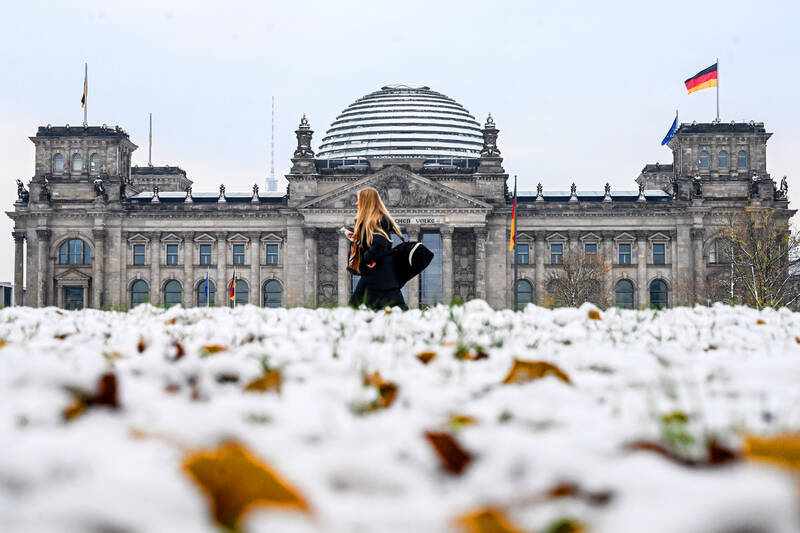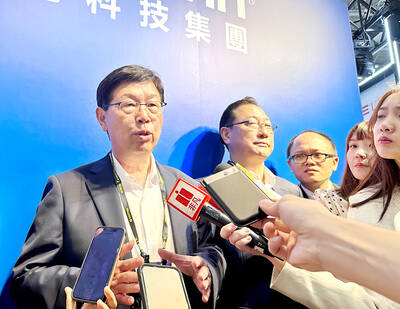The German Ministry of Foreign Affairs is planning to tighten rules for companies deeply exposed to China, making them disclose more information and possibly conduct stress tests for geopolitical risks, a confidential draft document seen by Reuters said.
The proposed measures are part of a new business strategy toward China being drawn up by the administration of German Chancellor Olaf Scholz as it seeks to reduce the country’s dependency on Asia’s economic superpower.
“The aim is to change the incentive structure for German companies with market economy instruments so that reducing export dependency is more attractive,” the document said, singling out the chemicals and vehicle industries.

Photo: EPA-EFE
A ministry spokesperson declined to comment.
The draft, written by staff under German Minister of Foreign Affairs Annalena Baerbock of the Alliance 90/The Greens party, has still to be agreed upon by other ministries. A final decision on the China strategy is expected early next year.
Deep trade ties bind Asia and Europe’s largest economies, with rapid Chinese expansion and demand for German vehicles and machinery fueling the country’s GDP growth over the past two decades. China became Germany’s largest trade partner in 2016.
However, the relationship has come under close scrutiny since Russia’s invasion of Ukraine in February, which led to the end of a decade-long energy relationship with Moscow and caused numerous international companies to close their businesses in Russia.
“We must not make this mistake again. This is the responsibility of politicians and companies,” the document said.
Among the steps outlined in the 65-page paper, some of which have already been reported, are tighter rules for firms active in China to ensure that geopolitical risks are accounted for.
“We aim to oblige companies particularly exposed to China to specify and summarize relevant China-related developments and figures, for example in the form of a separate notification obligation, on the basis of existing disclosure requirements,” the document said.
“On this basis, we will assess whether affected companies should conduct regular stress tests in order to identify China-specific risks at an early stage and take corrective measures,” it said.
Investment guarantees are to face greater scrutiny to take account of the environmental impact, work and social standards, and to avoid forced labor in the supply chain, the document said.
To avoid cluster risks, investment guarantees should be limited to 3 billion euros (US$3.1 billion) per company per country, it added.
The government also plans to tighten export credit guarantees to avoid unwanted technology transfer, in particular sensitive dual-use technologies and those that can be used for surveillance and repression, the document said.
The new strategy, pushed hard by the Greens in the coalition government, led by Social Democrat Scholz, but also including the pro-business Free Democrats, marks a departure from Berlin’s policies under Scholz’s conservative predecessor, Angela Merkel.

Taiwan Transport and Storage Corp (TTS, 台灣通運倉儲) yesterday unveiled its first electric tractor unit — manufactured by Volvo Trucks — in a ceremony in Taipei, and said the unit would soon be used to transport cement produced by Taiwan Cement Corp (TCC, 台灣水泥). Both TTS and TCC belong to TCC International Holdings Ltd (台泥國際集團). With the electric tractor unit, the Taipei-based cement firm would become the first in Taiwan to use electric vehicles to transport construction materials. TTS chairman Koo Kung-yi (辜公怡), Volvo Trucks vice president of sales and marketing Johan Selven, TCC president Roman Cheng (程耀輝) and Taikoo Motors Group

Among the rows of vibrators, rubber torsos and leather harnesses at a Chinese sex toys exhibition in Shanghai this weekend, the beginnings of an artificial intelligence (AI)-driven shift in the industry quietly pulsed. China manufactures about 70 percent of the world’s sex toys, most of it the “hardware” on display at the fair — whether that be technicolor tentacled dildos or hyper-realistic personalized silicone dolls. Yet smart toys have been rising in popularity for some time. Many major European and US brands already offer tech-enhanced products that can enable long-distance love, monitor well-being and even bring people one step closer to

RECORD-BREAKING: TSMC’s net profit last quarter beat market expectations by expanding 8.9% and it was the best first-quarter profit in the chipmaker’s history Taiwan Semiconductor Manufacturing Co (TSMC, 台積電), which counts Nvidia Corp as a key customer, yesterday said that artificial intelligence (AI) server chip revenue is set to more than double this year from last year amid rising demand. The chipmaker expects the growth momentum to continue in the next five years with an annual compound growth rate of 50 percent, TSMC chief executive officer C.C. Wei (魏哲家) told investors yesterday. By 2028, AI chips’ contribution to revenue would climb to about 20 percent from a percentage in the low teens, Wei said. “Almost all the AI innovators are working with TSMC to address the

FUTURE PLANS: Although the electric vehicle market is getting more competitive, Hon Hai would stick to its goal of seizing a 5 percent share globally, Young Liu said Hon Hai Precision Industry Co (鴻海精密), a major iPhone assembler and supplier of artificial intelligence (AI) servers powered by Nvidia Corp’s chips, yesterday said it has introduced a rotating chief executive structure as part of the company’s efforts to cultivate future leaders and to enhance corporate governance. The 50-year-old contract electronics maker reported sizable revenue of NT$6.16 trillion (US$189.67 billion) last year. Hon Hai, also known as Foxconn Technology Group (富士康科技集團), has been under the control of one man almost since its inception. A rotating CEO system is a rarity among Taiwanese businesses. Hon Hai has given leaders of the company’s six